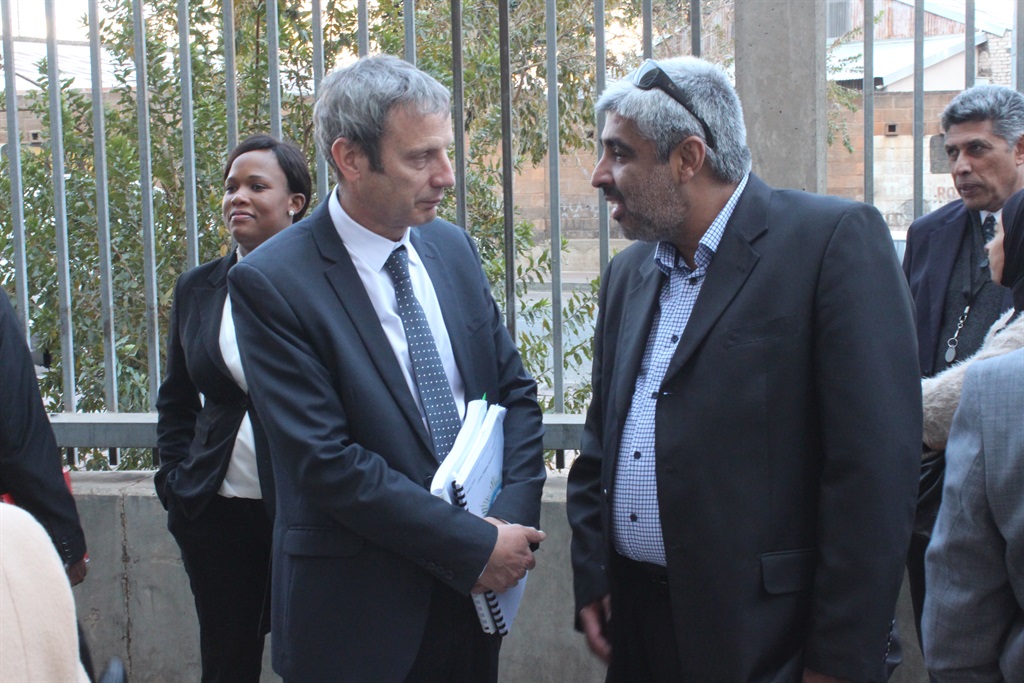
“My grandfather died a broken man after the loss of his eldest son,” Imtiaz Cajee told the North Gauteng High Court this morning on day 17 of the reopened Ahmed Timol inquest.
Cajee took to the stand as one of the last witnesses in the case, which was reopened after Cajee and the rest of the Timol family approached the National Prosecuting Authority in 2015 to have the investigation into the death of his uncle reopened.
Timol was arrested and detained at John Vorster Square (now Johannesburg Central Police Station) for four days in 1971, before falling from the 10th floor of the building.
Magistrate JL de Villiers, who oversaw the 1972 inquest into Timol’s death, ruled that he had jumped to his own death, and that no foul play was involved.
His family, however, has maintained throughout the years that Timol was either tortured to death or pushed or thrown out of the window – suicide was not an option for Timol, witnesses in the inquest have said.
Judge Billy Mothle has heard multiple testimonies over the last few weeks from several key experts, witnesses and former detainees – including chilling accounts of the brutality that detainees underwent when they were being held at John Vorster Square.
A key witness, Joao Roderigues, also testified over a three-day period. He told the court that he had seen Timol jump at around 4pm on October 27 1971. Roderigues maintained his innocence and denied any involvement with Timol’s death.
However, the testimonies of Abdullah Adam and Mohammed Thokan disputed the time of Timol’s death. Both men were at the Dollars petrol station, which was across the street from the building, when they heard the commotion and rushed to the noise.
They testified that they saw Timol’s body, which lay on the street, during the mid-morning hours of that fateful day.
Today, an emotional Cajee spoke of the trauma he and his family had been through after the death of his uncle, and the numerous times that they had tried to seek justice for his death.
During the Truth and Reconciliation Commission hearings, Cajee had to persuade his grandmother to testify, to tell her story about the impact of her son’s (Timol) death.
Cajee said that he was humbled that the inquest had been reopened 46 years after Timol’s death.
“The Timol family has an opportunity to present new evidence in a democratic South Africa and for that we are eternally grateful,” he said.
Cajee said that the death of his uncle affected his schooling and he had to educate himself on the politics of the country at that time.
Timol’s death shattered the family, Cajee said.
“I spent quite a bit of time with my grandfather. I would accompany him to the local cemetery in Roodepoort where we would go and visit my uncle’s grave, and I would recite versus from the holy Qur’an, paying tribute to my uncle,” Cajee said, emotionally.
It was 1981, 10 years after Timol’s death, that Cajee’s grandfather passed away a “broken man”.
Cajee has been the driving force behind the Timol Inquest, and underwent extensive research in order to gather as much evidence and facts about the circumstances surrounding his uncle’s death, by publishing a book, Timol: Quest for Justice, in 2005.
Between 5000 and 6000 copies of the book have been sold. Cajee explained that all royalties accrued from the sales have gone towards “legacy projects” in his uncle’s name.
Cajee put forward recommendations to the court today that the name of his uncle and of other political detainees be remembered through the form of a sculpture and that the south wing of the 10th floor of Johannesburg Central Police Station be converted into a museum tracking “the history of security detention and its abuses during the apartheid era”.
“The third recommendation my lord: the energetic and rigorous investigation of all apartheid cases that have not been concluded,” Cajee said.
Cajee explained that the process leading up to the reopening of the inquest was assisted by Yasmin Sookha, who is a former TRC commissioner, after approaching her in 2009.
“But my lord, I must acknowledge that I dragged and delayed,” he told Judge Billy Mothle.
“I dragged and delayed my feet because I felt the timing wasn’t right. Miss Sookha always waited for me and I disappeared off the radar,” Cajee said.
It was only in 2015 that Cajee decided to revisit the idea, along with Advocate Howard Varney, Yasmin Sookha and Frank Dutton, who was to lead the investigation into Timol’s death.
“He conducted his investigations my lord, and in January 2016 we had a meeting with the national director of public prosecutions, Mr Shaun Abrahams,” Cajee said.
At this meeting which was held at the NPA offices in Silverton, new evidence was presented to Abrahams by Dutton. The presentation of the new evidence warranted the reopening of the case. Also present at the meeting was senior counsel, Advocate George Bizos.
Shaun Abrahams granted permission to reopen the inquest on October 26 2016.
Abrahams was also present at last Friday’s sitting of the Timol inquest.
Proceedings resume on Wednesday morning at 10am, where it is expected that Roderigues will be taking to the witness stand once more.




 Publications
Publications
 Partners
Partners








